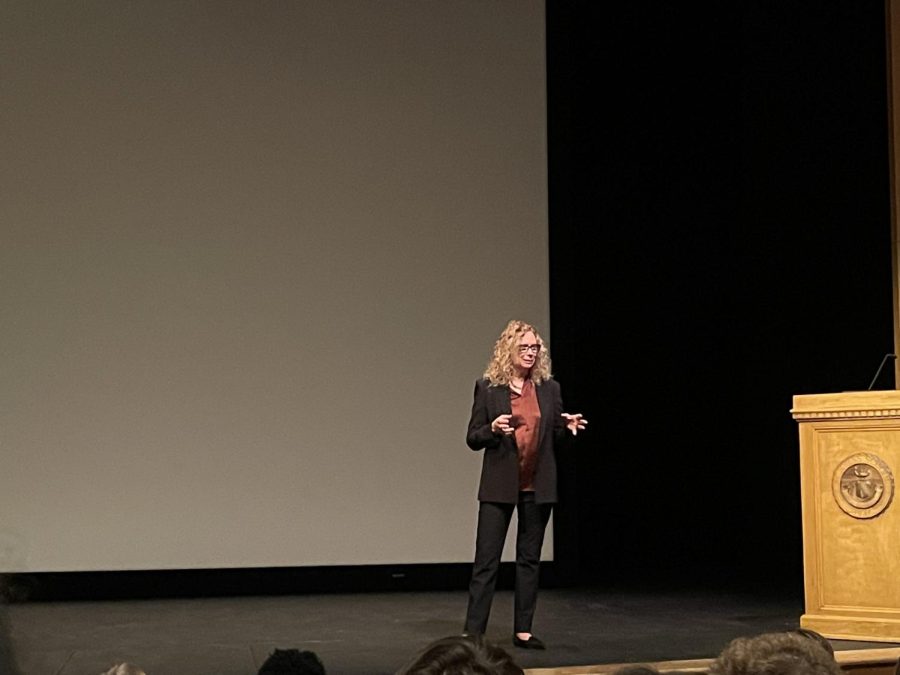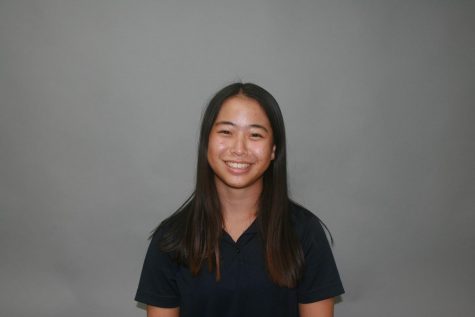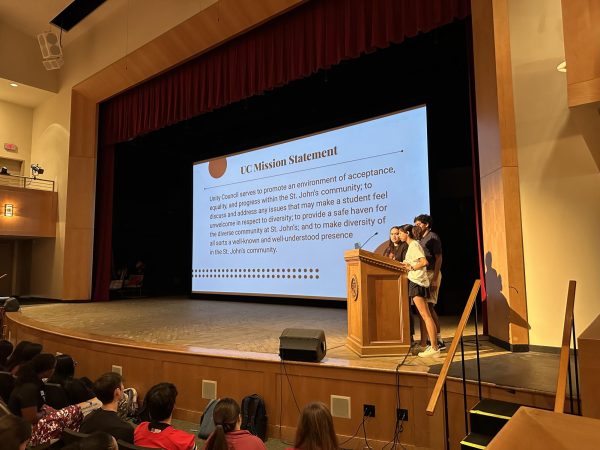Psychologist Catherine Steiner-Adair speaks to students about girls’ development
Psychologist Catherine Steiner-Adair gives a presentation during an assembly in Lowe Theater.
January 10, 2022
While audience members streamed out of the packed theater, discussions and debates started to echo throughout the VST. As students gradually made their way to class, they were left with new perspectives on topics ranging from gossip culture to the “like” button.
On Dec. 2, Catherine Steiner-Adair gave a presentation to Upper School students during an assembly. Her talk about girls’ development and social media came more than a month after her counterpart, Michael Thompson, discussed the psychology of boys and the academic gender gap.
“She struck a good balance between research and anecdotes,” history teacher Eleanor Cannon said. “Our community responds well when we know something is grounded in science.”
Steiner-Adair is a psychologist, who, since the publication of her award-winning book, “The Big Disconnect: Protecting Childhood and Family Relationships in the Digital Age,” has spoken around the world about children’s development. During her talk to the Upper School, she focused on the psychological development of young women.
“It was aimed towards girls,” freshman Eason Stimming said, “and that was better because [Dr. Thompson’s] assembly was geared more towards boys.”
Steiner-Adair focused in particular on the “tyranny of nice,” a phrase used to describe the psychological mindset of sacrificing one’s own needs and morality for the sake of being nice and polite. Steiner-Adair explained how society imbues this ideology into women from a young age, causing repercussions on their social and academic lives.
“I was glad she talked about [the tyranny of nice] and about how important it is to break that down,” Cannon said. “I think that’s important for this community as a whole.”
Our community responds well when we know something is grounded in science.
— Eleanor Cannon
To emphasize the detrimental effects of this mindset in girls’ minds, Steiner-Adair recounted a story about a girl named Alice, who gradually gave in to the tyranny of nice. As a young girl, Alice knew not to get into a car with a drunk driver. Yet a few years later, sixteen-year-old Alice found herself putting aside her own safety to satisfy a friend and her boyfriend, who Alice knew was driving under the influence.
“I teared up when she told that story,” Cannon said. “I’ve made similar bad choices in my life where I prioritized peace over what I knew was right. That breaks my heart for the old me, and it breaks my heart for girls.”
According to Steiner-Adair, another consequence of the tyranny of nice is the gossip culture surrounding girls. In fear of offending people, young women often don’t share their true opinions or emotions directly to a fellow peer, so they share with other, uninvolved people instead, creating rumors and tension.
“It’s not something that I’d ever really thought about before,” junior Mia Harris said. “That was the part of the assembly that made me really want to reach out to her.”
After the assembly, Harris and other Upper School students contacted Steiner-Adair via email to ask if there was any way to take part in her research as participants in studies or even as research assistants. Although Steiner-Adair replied that she was “all-set” in terms of her work, she encouraged the students to nourish their interest in the field.
“We need bright young people to carry on,” Steiner-Adair wrote. “Please stay curious and committed to making the world more equitable.”
Another part of Steiner-Adair’s presentation that both students and teachers connected with was her discussion about the effects of social media on girls’ mental health.
“Almost everyone has social media,” Stimming said. “It’s something that mostly everybody uses on a daily basis. People can actually relate, which made for a better presentation.”
In particular, Steiner-Adair discussed the detrimental effects of platforms like Instagram on girls, such as feeling insecure about their own bodies and depression. She also talked about the pressure of trying to get likes on a post and the inevitable disappointment one will feel when they don’t receive as many as their friends.
“I don’t think it was brand new news to anyone,” Senior Liv Rubenstein said. “Most people already knew about it, but it was still interesting to hear.”
Steiner-Adair’s segment on the effects of social media on girls ended up rushed due to time-constraints; this resulted in many feeling as though there was more to be said on the topic, especially because there was not enough time for a set question-and-answer session.
“I guess it’s great if she leaves you wanting more,” Cannon said. “She was really compelling and had so many more great things to say. I would’ve loved to sit down to have coffee with her, and talk more about social media.”
We need bright young people to carry on.
— Catherine Steiner-Adair
Despite her talk being cut short, students found much to discuss about it in the coming weeks. One aspect of her presentation that appealed to the Upper School community was her explaining that not all girls fit into one set of traits nor boys into another. This was an area that many felt Thompson did not succeed in as he did not make this distinction when talking about the differences between the genders.
“I think that it’s a dangerous game to play to say ‘always,’” Rubenstein said. “I know plenty of girls and guys that don’t fit into some of the traits she described, so I think she was accurate.”
Though both students and teachers appreciated Steiner-Adair’s distinctions when speaking about male and female traits, both her and Thompson’s assemblies highlighted a problem not specific to St. John’s: the exclusion of genderqueer people from the narrative. While Thompson’s talk was about the development of boys and Steiner-Adair’s about the psychology of girls, both gave little to no focus to those who do not identify as either girls or boys nor those who identify as a third gender. Many students, including Rubenstein, felt that neither assembly adequately addressed the development and struggles of genderqueer students.
Overall, though, Harris found the assembly to be generally well-received by the community.
“[Dr. Thompson’s] assembly didn’t really sit well,” Harris said. “But after this one, there were a lot of people who were really intrigued to learn more, and in general, the reaction of the student body was really positive.”

























